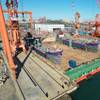LNG - Most Viable Alternative Fuel
SEA\LNG, a multi-sector industry coalition, created to accelerate the widespread adoption of liquefied natural gas (LNG) as a marine fuel, said that LNG is the most commercially viable alternative fuel for shipping today.
SEA\LNG released the findings of a new alternative fuels study today, which finds that LNG is the most mature, scalable, and commercially viable alternative fuel currently available for the maritime industry.
The study was conducted by Norway-based alternative fuel experts from DNV GL.
The study concludes that while there are a variety of lower or zero carbon alternative fuels that could help to meet the goals of the International Maritime Organisation’s (IMO) 2030 and 2050 greenhouse gas reduction targets, many of these alternatives require significant development to meet the industry’s needs.
The study also notes that many promising alternative fuels currently lack the regulatory framework, production capability and bunkering infrastructure for widespread adoption, and additionally are more expensive than traditional bunkers or LNG.
As such, in a period where the industry is under considerable pressure to take steps to reduce GHG and other emissions to air, LNG is a solution that could help to move the industry forward, while laying the ground work for lower or carbon neutral fuels produced from renewable or zero-carbon energy.
Based on existing industry and academic literature, the study comprehensively evaluates the commercial and operational viability of six of the main alternative fuels: hydrogen, ammonia, methanol, LPG, biofuel, in the form of hydrotreated vegetable oil, and full battery-electric systems.
It examines how they perform against LNG on a set of 11 key parameters, covering considerations such as applicability, scalability, economics and environmental performance.
SEA\LNG Chairman Peter Keller stated: “Modern ships have a life expectancy of around a quarter of a century. Investors need to know how the capital expenditures for installed engines and their operational costs, including choice of fuel, will be impacted by current and future environmental legislation. With several marine fuel options to consider, SEA\LNG commissioned this study from DNV GL to support the industry in its decision-making.”
Earlier studies commissioned by SEA\LNG add further weight to LNG’s credentials as a commercially and environmentally sound marine fuel. Multiple independent studies conducted by Opsiana have demonstrated better return on investment from LNG under a wide range of scenarios.
Click here for the study













